By Aniruddh ‘Andrew’ Bansal
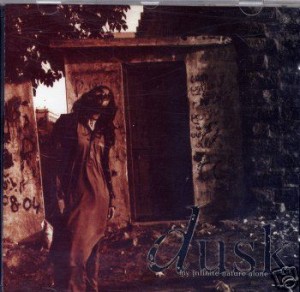 Hailing from the Pakistani city of Karachi, Dusk have gone through a few phases, starting out as a doom/death metal band in their formative years, then moving to a progressive metal style and later on to a death/thrash. Now, they seem to have made a comeback to the doom realm, and are set to release a split album with Indian doom veterans Dying Embrace, on Cylopean Eye Productions. Earlier today, I had a detailed conversation with Dusk guitarist/bassist/vocalist Babar Sheikh, to talk about the band’s comeback, musical style changes, lineups, and various other topics. Enjoy the conversation below as Babar opens up and gives an honest account of everything.
Hailing from the Pakistani city of Karachi, Dusk have gone through a few phases, starting out as a doom/death metal band in their formative years, then moving to a progressive metal style and later on to a death/thrash. Now, they seem to have made a comeback to the doom realm, and are set to release a split album with Indian doom veterans Dying Embrace, on Cylopean Eye Productions. Earlier today, I had a detailed conversation with Dusk guitarist/bassist/vocalist Babar Sheikh, to talk about the band’s comeback, musical style changes, lineups, and various other topics. Enjoy the conversation below as Babar opens up and gives an honest account of everything.
I was just reading about the band’s history, and it seems like you’ve been through some changes in musical style. What’s the plan from now on? Are you back to being a doom metal band again?
That’s a very good question, and a very important question as far as Dusk is concerned. What happened was, when we started out, we essentially were a death metal band. We discovered the first generation of European bands playing death metal and we were really obsessed by them. You could call us being influenced by Venom, Bathory, and all that kind of stuff. Obviously then we later on discovered the Florida movement which was from the late 80s up till the early 90s. So our sound was pretty much you could say a translation of those different styles. But, eventually what happened was, by the time our first promo tape came out in 1995, by this time we were discovering that we’d like to play more mid-tempo, more sort of mid-paced death metal, which automatically lingers you towards the doom style. It has those kinds of leanings. So that’s what we were doing. From that period up until the late 90s was the period when we recorded our first album, and by this time, a very, very famous gentleman who I’m sure is very well known in India also, Mr. Faraz Anwar, a Pakistani guitar wizard and viruoso, he joined the ranks of the band. You know, being the frontman of the band I always sort of encouraged people to bring in influences, and bring in their own need to sort of transform the sound of the band if they want to. I’ve been very open-minded towards all of that. So when Faraz came in, he was getting into a whole lot of different things in his life at that point, like jazz, a lot of fusion jazz, a lot of Allan Holdsworth, Sypro Gyra, and these kind of bands.
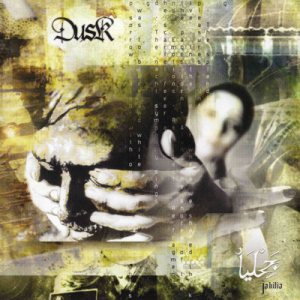 I allowed him and I was okay with him bringing those influences, so our first album was a very strange album because some songs that were written by me totally were like more mid-tempo death/doom metal, and then there was some stuff which was almost like ballady. Then there were these intros and outros that were very majestic sounding, very experimental sounding, that Faraz had created. And from there onwards till the next album ‘Jahilia’ which was our second full-length, we made a more steep shift into the sound. We well in for really fucked up time signatures and over-the-top technical bit. By the time we went on our first European tour which was in 2004, I realized that this was not what I wanted to do for the rest of my life. I didn’t want to be categorized as a prog band. I was like, ‘Man, where are all the Motörhead songs I grew up listening to? Where is all the Black Sabbath in the riffs? It’s all gone missing!’ And that usually happens with a lot of bands as they rediscover their roots. This was the same time that me and Faraz had a falling out because of some personal and musical differences, and I went my own way. Before I went to record stuff which was more rootsy, I sort of did a very ambient kind of album with almost no guitars on it. I think a lot of people would disagree with me and would say, ‘Why don’t you get side projects to do all these different ventures?’ May be it’s my fault that I didn’t, but after that we came back to the roots.
I allowed him and I was okay with him bringing those influences, so our first album was a very strange album because some songs that were written by me totally were like more mid-tempo death/doom metal, and then there was some stuff which was almost like ballady. Then there were these intros and outros that were very majestic sounding, very experimental sounding, that Faraz had created. And from there onwards till the next album ‘Jahilia’ which was our second full-length, we made a more steep shift into the sound. We well in for really fucked up time signatures and over-the-top technical bit. By the time we went on our first European tour which was in 2004, I realized that this was not what I wanted to do for the rest of my life. I didn’t want to be categorized as a prog band. I was like, ‘Man, where are all the Motörhead songs I grew up listening to? Where is all the Black Sabbath in the riffs? It’s all gone missing!’ And that usually happens with a lot of bands as they rediscover their roots. This was the same time that me and Faraz had a falling out because of some personal and musical differences, and I went my own way. Before I went to record stuff which was more rootsy, I sort of did a very ambient kind of album with almost no guitars on it. I think a lot of people would disagree with me and would say, ‘Why don’t you get side projects to do all these different ventures?’ May be it’s my fault that I didn’t, but after that we came back to the roots.
If you remember, we did a 3-way split album with Demonic Resurrection and Severe Dementia, and on this we were playing doom and death metal again. Then we had a strange 5-year phase, which I really can’t explain to you. But we had a 5-year absence again from doom/death metal where we actually started playing thrash (laughs). I don’t know how to explain it, but I think over the years now I’ve realized what Dusk really is, and a lot of it is because of you guys out there in India. Even more than Pakistan, we have a following in India, in Bangladesh, Sri Lanka, Thailand and places like that. All the fans that I’ve met and hung out with throughout in my travels, all of them have come up to me and said, ‘We recognize Dusk as a premier doom metal band from Asia, and nothing else.’ And that sort of convinced me. Sometimes that sort of thing gives you the answer. A lot of credit goes to Vikram of Dying Embrace, and Sandesh Shenoy, our manager, who actually kicked us back into action. For me it’s always been friends, fans and family who’s gotten me stronger, and that’s exactly what it is. I needed people who were into Dusk for 12-15 years, for them to come up to me and tell me what they recognized Dusk as. So I said, ‘Yeah man, you’re actually right. Let’s do it!’ And now we’re back playing doom metal again, stuff sounds amazing and I had riffs in my head for all these years that I was dying to write and rehearse, and we’re finally doing that!
 So, this split album with Dying Embrace is supposed to come out this year, and it will be on Cyclopean Eye Productions. How did you first get in contact with Sandesh and Vikram?
So, this split album with Dying Embrace is supposed to come out this year, and it will be on Cyclopean Eye Productions. How did you first get in contact with Sandesh and Vikram?
I always knew Sandesh. I got in touch with him when he wrote to me in the late 90s or early 2000s. He was just a man who knew nearly all the bands. When I found out he was from Bangalore, the first thing I was asking him was, ‘Do you know Millennium?!’ And he said he knew them. I was big on those guys when I was young! So Sandesh and I had a regular chit chat about which bands we knew. I’ve known him for a while and he’s been my prime contact in India, even though I’ve known a lot of other people like Sahil Makhija and there were a few other people who were doing freelance journalism for various publications abroad and were based in India. But Sandesh is someone who has really stood the test of time. I do so many other things and I’m involved in other professions along with music, and it’s kind of tough because sometimes I don’t respond for the longest time to my friends and family. It’s tough for being around to tolerate all that, but he’s been a fan of the band and he’s been there. Sandesh and Vikram are really good friends, and for the longest time I knew about Vikram but we were never directly in contact. Dying Embrace has this mystique about it, because it was there and then it disbanded. I think for Dusk and for Dying Embrace, most of the things that come as surprises, specially for Dusk, would be that I had no fucking idea it was this big in many places! Many people who’re now working as promoters or band leaders, 12 years ago they were younger people really digging our music! So this stuff actually reached out to people, they love it and associate with it.
When the idea came and Sandesh finally said we’ll release something, I had the idea of recording a couple of songs. Sandesh was going to approach some bands from Mumbai, and from Colombo in Sri Lanka. But I was like, ‘Why can’t you ask Vikram and Dying Embrace to do a split?’ But they wanted to do a full-length album. I was disappointed to hear that. It’s so apt that two doom metal bands from Pakistan and India, sleeping for the longest time in the slumber and now finally waking up. So Sandesh said he loved the idea but he didn’t think it was going to happen. Meanwhile, I went to Singapore where my drummer resides. I met him and showed him all the riffs I was working on. We went to TNT recording studios over there and recorded that stuff. It sounded massive, it sounded like a dinosaur, and it sounded big. Over the years, we all get some kind of maturity through technicality and other things like that. So all of these things also come into your music. I made an unmixed version of one of the songs and sent it to Sandesh, and he was pretty blown away by it. I asked him to make the Dying Embrace guys listen to this sampe. I think Vikram was always interested in doing something with us but it was tough for Sandesh to convince the whole band initially. When they heard the song, it came across to them, and they said they were ready to do a split with Dusk. So that was the story of the split actually, and I’m very excited about it.
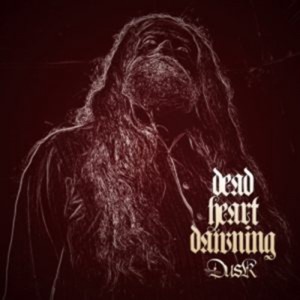 Now that you’re doing this doom metal thing again, do you feel like this is almost like a true debut for Dusk? It’s what it was always supposed to be from the beginning, isn’t it?
Now that you’re doing this doom metal thing again, do you feel like this is almost like a true debut for Dusk? It’s what it was always supposed to be from the beginning, isn’t it?
May be it is. I think after this split it’ll definitely be the beginning of new things for us, and for both bands. Obviously I can speak on behalf of Dusk only, but it’s going to solidify our image and existence as a doom metal band. From here onwards, I’d like to think of Dusk as a premier doom/death metal band from Pakistan, which we always were. We were one of the first metal bands to actually start out in Pakistan, and this is the stuff we enjoy doing. It is a non-stop homage to Black Sabbath and all the doom masters that we’ve had like Candlemass, Saint Vitus and all the other bands around the world that we grew up listening to, and mixing it with the sensibility and brutality of death metal. So, from now on, even when we start thinking about recording our next full-length album, it’s going to be in the same vein as the new material that we’ve recorded for the split.
Another change in the band has been that you’ve started doing vocals again since 2010. Before that you had a vocalist for a while.
When Dusk started out, I was doing vocals myself. On the first two full-length albums and the first two demos, it is all me on vocals. You change as a person a lot, and I’ve always been someone who has invited other people to do stuff. When I wanted to record the ‘Dead Heart Dawning’ EP which came out in 2006 and also came out as a split album with Demonic Resurrection, at that time I was sort of ready to do anything in life that would excite me or challenge me. So I just wanted to be a bass player. I always really envied the guys playing on the left of stage head-banging on songs just playing the bass. I always wanted to do that, and I felt like it was too much responsibility being the vocalist. So I asked Yusri Durjana who’s actually the frontman for a very famous Singaporean underground band. Well, it can’t be famous and underground at the same time, so that’s a little bit of a contradiction (laughs), but anyhow, Yusri is a frontman for quite an interesting outfit in Singapore called Cardiac Necropsy. I’ve been a fan of them since a long time now. I’ve been very closely associated with the Singaporean metal scene, so I asked Yusri as he wasn’t singing in any band at that time. He did the stuff on Dead Heart Dawning, and alter on some more stuff even when we started doing our thrash thing. He accompanied me with that too for a while. Then eventually, when I started recording for this split again, I thought I’ll just do it myself, to avoid complications and to get a clarity. Sometimes you want your vision to be completely … I didn’t want it to be filtered in any way. I knew the vocal lines when I was writing the riffs and bass lines. I also played the guitars and bass myself, the vocals, and everything except my new guitarist who is going to do some licks, fill-ins and solos here and there. Most of the stuff was like a visionary thing for me. I wanted it to sound like this and that’s exactly how I did it.
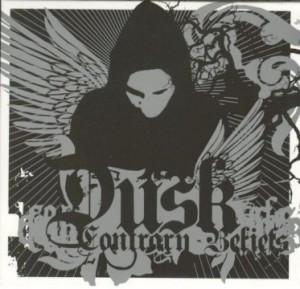 You’ve had constant lineup changes in the lineup. Do you think that’s a problem faced more often in countries like Pakistan and India, because metal is not exactly a lucrative business?
You’ve had constant lineup changes in the lineup. Do you think that’s a problem faced more often in countries like Pakistan and India, because metal is not exactly a lucrative business?
No I don’t think so. I don’t agree with you, because I play in several bands. A lot of them are non-metal bands. By the way, as we speak right now, in an hour I have to be in a meeting with my other band. I’m playing in a band which is a mix between ambient rock and psychedelic rock from the 70s, mixed with some sub-continental folk music. The people I’m meeting are full-time musicians. They are living off doing music. But with metal, the problem that I see is a lack of commitment. I’ve always envied you guys in India and other parts of Asia. I spent a lot of time in Singapore and Thailand, and people there are serious when they want to do metal. They’re not concerned about hitting the fucking red carpets of fashion shows, having music videos out on TV, they’re not in it for the chicks or the drugs. They’re just in it for the rock ‘n roll. This attitude, unfortunately, I never saw flourishing in a place like Pakistan, specially where heavy rock or metal is concerned. It never took off. It’s such a sad thing that at this point in my career, when I’ve had Dusk for over 17 years of my life, the biggest fantasy still is to have a full lineup that would actually rehearse twice a week and go out to play shows. Firstly we don’t have metal shows here, and secondly we don’t have metal musicians that are dedicated, like we have rock or pop musicians. When I parted ways with Faraz, I recruited Kamran Farooqi, also known as Coffin Feeder. He was the singer for another Pakistani death metal band at that time. I asked him to come and do drums, and he was a good drummer. I also recruited another guitar player locally, and I really wanted that lineup to actually flourish and go places. But it hasn’t been an easy ride, and more than the lucrative thing that you’re saying, I think it has got to do more with being a dedicated metalhead.
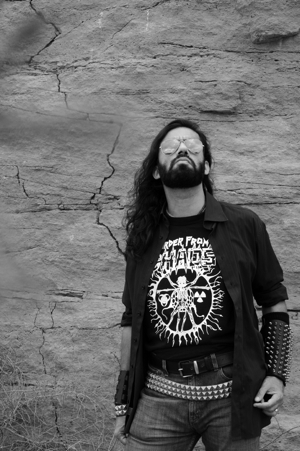 You’re right. It’s a problem of commitment. If you are committed, you will make it lucrative at some stage.
You’re right. It’s a problem of commitment. If you are committed, you will make it lucrative at some stage.
Yes, exactly! And you have to stop thinking of shortcuts. I remember in the mid-90s when I used to hang out with bands in Singapore like Harvester, Cardiac Necropsy, Bastardized and all these bands. Most of us were students back then, and everyone was bringing 6 or 7 dollars from their pocket money or whatever, and just putting it together to rent a small jam room. When I asked them what they planned to do with their music, they said they’d do an album, a demo or just not do anything and play because they had fun playing. So, I really idealized that attitude. I was like, wow, this is something that will go places, and these bands have gone places.
And this problem is not just prevalent in Pakistan, but in India as well. I don’t really see the commitment from a lot of bands.
Yeah, it’s really like a full-time job. In 2007, I briefly joined Impiety as a bass player, and if you look at the credits I’ve also played on one of their albums, ‘Formidonis Nex Cultus’. It’s serious commitment, man. It’s no joke. So unless and until you’re actually in it full time with all your dedication, it’s not for you.
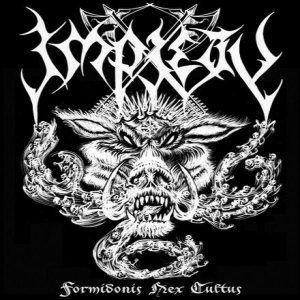 That’s very true. I was going to ask you about your Impiety stint. Why was your stay in the band so short-lived?
That’s very true. I was going to ask you about your Impiety stint. Why was your stay in the band so short-lived?
What happened was, me and Ariffeen have been really good friends for a while. He’s also known as Shyaithan. He’s the frontman and leader of the band, and all respect to him because I think he’s been really taking the name of Asia through the globe. He’s just done so much for the Asian metal scene. I think without saying anything more, a lot of people truly respect him. He used to run a metal shop in Singapore at that time. It was called ‘To Mega Therion’, named after the Celtic Frost album. We used to hang out there with several other metalheads. We listened to metal and talked about stuff. I think the following year after that, he contacted me and asked if I’d like to come in and play in the band! That was a big thing for me. I went to Singapore to record and rehearse with him. I did all of that and I was staying there for almost 3 weeks. Soon after that the recording happened, but one thing that I sort of didn’t realize was, this was a time in my life where I really needed to focus on my career. Before this I was traveling for several years with different projects of mine related to art and film, and that’s what I do on a professional basis. That is how I make my livelihood. So I was traveling a lot and I needed to focus on the Pakistani wing of my office. It seemed like with Impiety I had to again go for two months on a European tour, and other tours following that. So, it was just bad timing. I had this realization, I couldn’t justify it in my head and at the same time Ariffeen was kind enough to listen to me. He was very professional. I gave them a two-month notice before the tour, and so they had enough time and had one of their previous bass players come in to take my place in the European tour. So that’s why it was really short-lived, unfortunately.
You mentioned the non-metal side projects. Have you developed a stronger interest in those genres as well?
I’ve always been interested. I’ve been heavily into world music. I’m a big fan of contemporary African music. I’m really big on a lot of Bengali music, and nearly all folk music from the sub-continent. I’m really huge on Punjabi, Pushto and Sindhi folk music. Over the years, I’ve learnt to love and to respect the cultures. We’re all into rock ‘n roll essentially. We all listen to that since we were children, we all grow up with that and then we develop our love for metal and all these other sub-genres. But obviously, rock ‘n roll is still my favorite type of music. I still love to listen to really loud stuff. It’s fun that you can say you’re in your mid-30s and you can still play and enjoy that stuff! But yes, over the years I’ve learnt to respect a lot of genres. Most of them are very organic and sort of soul-oriented, so essentially I do see the spirit of rock ‘n roll reflected in all of these other kinds of music as well.
That’s interesting, man. So I have just one final question for you, for this interview. The original name of this band was Carcinogenic, which is a cool name. Dusk is cool too, but why did you change it?
When we started out, I think we called ourselves Carcinogen and not genic, but then we found out there was a band called Carcinogen. So that sucked. I read it in the American magazine Metal Maniacs. Then we called ourselves Carcinogenic, and I think one of the members of the band just disagreed. There was too much confusion between Carcinogen and Carcinogenic, and just to avoid confusion we decided to call it Dusk. We didn’t know at that time that there would be several other bands in the world called Dusk as well. I also thought that Dusk gives me the allowance to do different styles of music, but it’s essentially a very doom-sounding name. It just seemed like the right thing to call the band, and it also has a lot to do with twilight and how the two different parts of the day are meeting. The day is ending and the night is beginning. You know how at that time you’re obsessed with staying up nights, listening to a lot of metal, reading up on the occult and all those things. So I did all of that stuff and it seemed cool. It was a heavy name.
It’s easier to pronounce too!
(Laughs) Yeah, exactly.
Links:
duskhorde.bandcamp.com